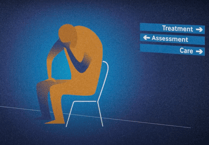The Welsh Parliament voted against the principle of assisted dying in a historic vote.
Senedd members voted 26-19, with nine abstaining, against a non-binding motion calling on the Welsh Government to back the principle of assisted dying.
The Senedd rejected a similar motion a decade ago in December 2014.
Julie Morgan said it was important to debate the issue again in light of Kim Leadbeater’s assisted dying bill which was introduced in the House of Commons last week.
Ms Morgan accepted powers over assisted dying are reserved to Westminster but pointed out the Senedd is responsible for health, so Wales would have to implement any new law.
‘Compassion’
The Labour politician raised similar bills in Scotland, the Isle of Man and House of Lords, with Jersey’s assembly this year approving plans in principle to legalise assisted dying.
She explained that 31 jurisdictions around the world have already legalised assisted dying, including Australia, the Netherlands and Canada.
Ms Morgan said: “I believe we need to show more compassion to those people who are suffering intolerably from incurable illness and who have a settled wish to die.”
She told the Senedd that every eight days one person goes to Dignitas or a similar end-of-life centre in Switzerland, with the average cost from £10,000-£15,000.
“This means it is only an option for the wealthy,” she warned.
‘Cruel’
Ms Morgan pointed to comments from Sir Max Hill, the ex-director of public prosecutions who warned it took up to two years to take decisions not to prosecute elderly relatives.
“Imagine having that hanging over you at a time of great loss,” she said. “What a cruel law, surely we can do better than that?”
The former MP raised the case of Sue Lawford, from Cardiff, who described the horror she experienced after she was arrested for taking Sharon Johnston to Dignitas from Cardigan.
She said: “The law is not clear and I want to have a more compassionate law, so families do not suffer in this way … I think it is our duty to look at doing this.”
Ms Morgan, who represents Cardiff North, told the debating chamber or Siambr that public opinion has shifted, with a majority now supportive of legalising assisted dying.
‘Dangerous’
But Joel James was deeply concerned by the motion, warning that a change in law would set a dangerous precedent and lead to a catalogue of unintended consequences.
He said: “It has been repeatedly proven that assisted dying laws when introduced descend into … problems from coercion by relatives to the hand picking of specific doctors.”
The Conservative warned of a trend to broaden the eligibility criteria, with some countries expanding laws to include children and those suffering solely from mental health issues.
Plaid Cymru’s Delyth Jewell voted against, telling the Senedd: “My fear with this motion – well, my terror, really – is not so much with how it will begin as with how it will end.”
She warned people could be placed under pressure to end their lives because the necessary palliative care is not available or they feel themselves to be a burden.
‘Sacrosanct’
Ms Jewell said no safeguard is sacrosanct as she raised concerns eligibility could be extended to depression, anorexia and other conditions people can recover from.
Mick Antoniw, a Labour backbencher who took part in the debate 10 years ago, supported the motion, suggesting parts of the bill will likely require the Senedd’s legislative consent.
Sam Rowlands, the Conservatives’ shadow health secretary, cautioned that the motion sends a message that not all lives have the same level of value in society.
Labour’s Lee Waters intervened, asking: “If we value all lives, surely we value the right of individuals to make choices about their lives and how their lives end?”
Mr Rowlands questioned whether there is a real choice, warning a right to die could become a duty, and suggested the law will be challenged in the courts on grounds of equal access.
‘Huge ramifications’
Rhys ab Owen, an independent, told the Senedd his father Owen John Thomas, a former Senedd member, died in May after suffering from Alzheimer’s for 12 years.
“They were cruel years,” he said. “They were cruel to us as a family and there are no words to describe how cruel the experience was for him. Who are we, who am I, to force any person to live through that experience if they don’t wish to do so?”
The Conservatives’ Darren Millar said legalising assisted suicide is fraught with dangers as he called for investment in end-of-life care, with hospices currently facing financial crisis.
Responding to the debate on October 23, Jeremy Miles confirmed his cabinet colleagues and Labour backbenchers would be given a free vote on the matter of conscience.
The health secretary, who was appointed in September, said assisted dying is not devolved but, if passed, the Westminster bills will have “huge ramifications” for Wales.
‘Suffering’
James Evans told the Senedd he got into politics due to his grandmother who had dementia and suffered a stroke, leaving her incapacitated with no quality of life.
Mr Evans, who co-submitted the motion, said his grandfather was threatened with prosecution for manslaughter if he let her life end naturally.
He said: “My grandfather regretted that decision he had to make then to extend my nan's life for the rest of his days. I made a promise to both of them: I would never let anybody suffer like that again and that's why I support this today.”
Closing the debate, the Conservative raised comments from a husband who watched his wife starve to death because she did not want to risk her loved one being prosecuted.
Mr Evans said: “She suffered for about a whole week, starving herself, not drinking, because she wanted to end her life. There’s nothing religiously moral about that. That’s suffering … no-one should have to end their life in that way.”





Comments
This article has no comments yet. Be the first to leave a comment.